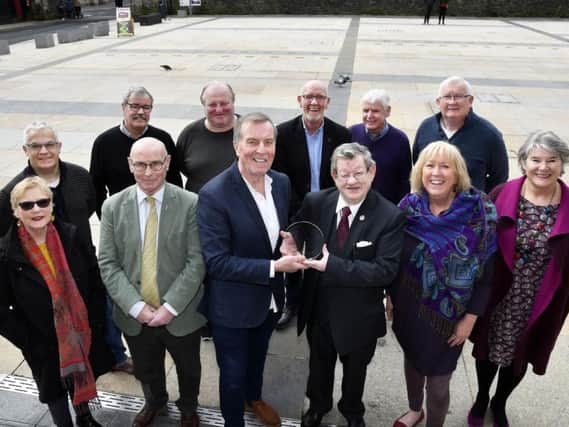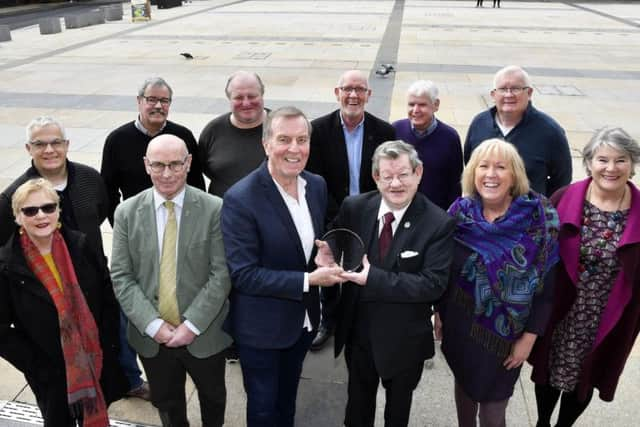Video: Fionnbarra Ó Dochartaigh recalls delight at end of Corporation as he collects civil rights award


Mr. Ó Dochartaigh said the removal of the Corporation, that discriminated against nationalists in jobs and housing by way of a cynical unionist gerrymander from the 1930s onwards, had been one of the central planks of the civil rights movement.
“We never thought we’d get a majority in the Guildhall. We never thought we’d have ‘one man, one vote’, or should I say, ‘one person, one vote’,” he said.
Advertisement
Hide AdAdvertisement
Hide AdThe historian and author, a co-founder of the civil rights movement in Derry, was speaking after receiving a life-time achievement award from the Civil Rights 1968 Commemoration Committee in the Guildhall on Saturday.


He said the former Prime Minister Terence O’Neill’s decision to replace the Corporation with a Development Commission in 1969, under pressure from the civil rights movement, followed later of course by the enactment of the Local Government (NI) Act in 1972, helped end unionist domination in Derry for ever.
The Corporation met for the last time 50 years ago this week when, according to a report from the ‘Journal’ ‘We Shall Overcome’, the civil rights anthem, and shouts of ‘good riddance’ had rung out from the public gallery.
Mr. Ó Dochartaigh said its dissolution had taken another brick out of the old majoritarian unionist regime that had ruled in a deeply partisan manner from the 1920s.
Advertisement
Hide AdAdvertisement
Hide Ad“This was the bastion of unionism. The last nationalist Mayor had been Hugh C. O’Doherty. That was in the 1920s when we had proportional representation (PR). Then they changed it from PR to a straight vote,” he reflected.
There followed the manipulation of ward boundaries to ensure unionism was over-represented at local government level, he said.
“After that it meant nationalists elected eight representatives and unionists elected 12. The votes were very important because it was tied up with economic policy and economic expansion. The Mayor had total control of housing and housing was allocated on a gerrymandered basis,” he noted.
Mr. Ó Dochartaigh, who from his mid-teens was highly active on several social issues, primarily when honourable secretary to both the Derry Unemployed Action Committee (DUAC) and the Derry Housing Action Committee (DHAC), said getting rid of the Corporation was considered a major achievement.
Advertisement
Hide AdAdvertisement
Hide Ad“That was a great delight. They replaced it with a Commission. People think it all started in 1968 but people like me were working from the early 1960s,” he remarked.
The civil rights veteran was one of the main organisers who had defied former Minister for Home Affairs William Craig’s decision to ban the seminal October 5, 1968, Northern Ireland Civil Rights Association (NICRA) march that was battered off the streets at Duke Street in what was regarded as a watershed moment.
Mr. Ó Dochartaigh said he remembered being told by a giant of the old guard of Derry politics in the mid 20th century how the civil rights campaign had worked far better than what once passed for parliamentarism in the North.
“Eddie McAteer put it this way: ‘Look, I’m going to take my cap off to you people. You achieved more over a period of six months than there was in all the years I was at Stormont. All we got passed was a ‘Wild Birds Act’,” said Ó Dochartaigh.
Advertisement
Hide AdAdvertisement
Hide AdThese had been gracious words from the late Nationalist leader, who in February 1969 had lost the seat for Foyle, which he had held since 1953.
Mr. Ó Dochartaigh recalled that Mr. McAteer who was swept aside by the Independent nationalist John Hume on a wave of pro-civil rights sentiment, had also been adamant that DHAC, DUAC and NICRA, had achieved more than the methods of his brother Hugh, who had served as Chief of Staff of the IRA in the early 1940s.
“What Eddie was saying was that the people of Derry on the streets achieved more than all the bombs and the bullets and the rest that went on from the 1920,” he declared.
Mr. Ó Dochartaigh was the last honourable secretary of the Derry Citizens Action Committee (DCAC), formed four days after the RUC attacked the October 5 march at Duke Street. DCAC was a cross-community grouping composed of figures like Mr. Hume, Ivan Cooper, Claude Wilton, James Doherty, Michael Canavan, Raymond McClean and Donald McDermott.
Advertisement
Hide AdAdvertisement
Hide AdAfter receiving his life-time achievement award Mr. Ó Dochartaigh said the upcoming generations could take important lessons from DCAC’s legacy of direct action.
“There’s a very strong message from the civil rights period. Things can be achieved by peaceful means. Of course, the struggle went on but we achieved a hell of a lot and I think the younger generation should sit back and think about it. The real parliament for the people is on the streets.
“The people have to mobilise, to start at the grass roots and work up. Not everything comes from the top. The people at the top only move with the grass roots at the bottom rattling the branches,” he insisted.